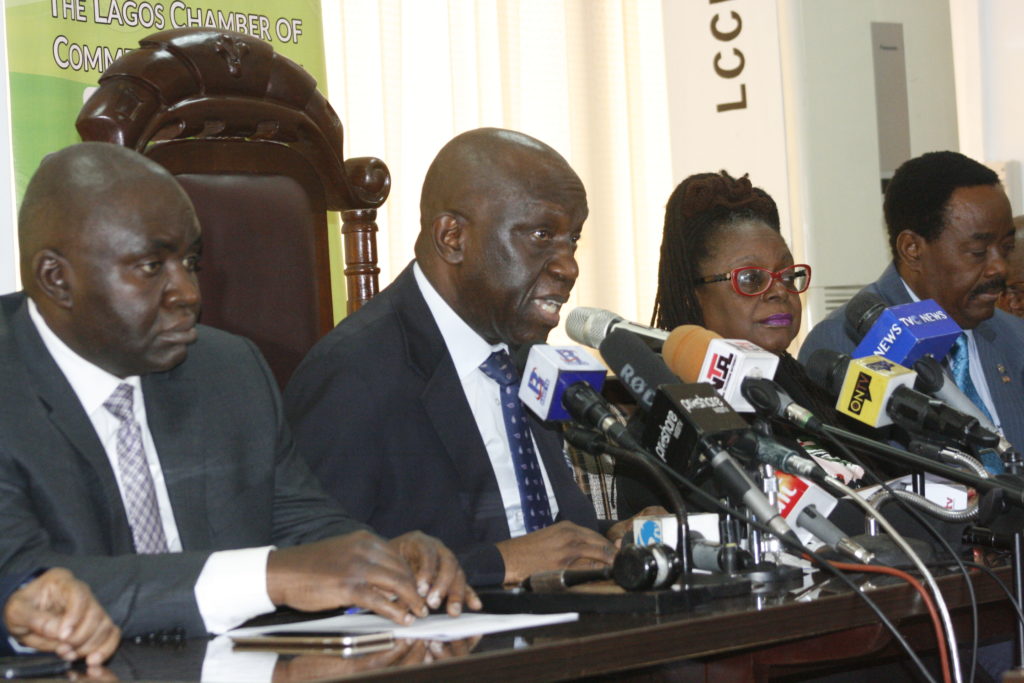…Sets second term agenda for President
Following the declaration of President Muhammadu Buhari as the winner of the Presidential election held on Saturday February 23, 2019 by the Independent National Electoral Commission (INEC), the Lagos Chamber of Commerce and Industry has set agenda for the president even as it called on him to commit to policies and programmes that will accelerate economic growth and ensure that the growth rate surpasses the rate of population.
The President of LCCI, Mr. Babatunde Paul Ruwase who made this call in a press briefing in Lagos on Tuesday to set agenda for President Buhari in his second term in office noted that although the full year Gross Domestic Product (GDP) growth for the year 2018 was 1.9% better than 2017 0.8%, the performance was still weak and fragile adding it was also far below the 3% annual population growth as it remained a cause for concern due to its implication for poverty and sustainable growth in the country.
Ruwase added that private sector investment was a critical growth driver saying that government should commit to creation of an enabling environment to bring about a quantum leap in private investment even as he suggested that tax policy, trade policy, monetary policy and foreign exchange policy must be in alignment with this objective.
While observing that the LCCI recognized the Economic Recovery Growth Plan (ERGP) as the main economic policy document of the present administration, he added that the plan underscored the philosophy of private sector led economy.
“It is therefore important for government policies and actions to be in tandem with the content and direction of the ERGP. The private sector should be positioned to play the role expected of it in this important policy document. This economy is blessed with quality entrepreneurs that can transform our huge potentials into concrete outcomes and value creation if they have the right environment”, he said.
On funding of government operations, the LCCI president while recalling that top government functionaries had repeatedly expressed concerns over the funding gap that exist in government however harped on the need to quickly develop a fiscal sustainability strategy as the administration progresses into its second term.
He said, “We need to deal urgently with the cost of governance as well as the issue of value for money in government expenditure. We recognize that there is a correlation between investment growth, GDP performance and tax revenue. This underscores the very important role that investment can play in boosting the revenue of government. As investment grows, job creation will improve and tax revenue will be positively impacted.
“The government also needs to watch the growth of recurrent expenditure in order to give more room for infrastructure financing. Currently, the summation of recurrent expenditure and debt service is equal to the total government revenue. This financing structure is certainly not sustainable; what this means is that capital project will naturally be funded by borrowed funds. It is important to put in place an appropriate Public Private Partnership to attract private capital in the financing of bankable public sector projects”.
Speaking on economic integration, Mr. Ruwase pointed out that it was the view of the Chamber that the Nigerian economy has more to gain by being part of the economic integration process at the regional level (ECOWAS) and at the continental level (AFCFTA) while appreciating the concerns of the manufacturers on competitiveness issues especially arising from possible non adherence to the rule of origin by some of the participating countries.
According to him, “We therefore urge that as this administration gets into its second term, appropriate safe guard measures should be put in place to protect vulnerable sectors of the economy and to also ensure that there is effective enforcement of the rules of origin. Once this is done, we request that Nigeria signs the AFCFTA (Africa Continental Free Trade Agreement)”.
He further contended that in order to attract more foreign investments, Nigeria’s Visa policy regime should be more liberal advising the government to grant nationals of selected advanced economies Visa free entry into the country for a maximum of 30 days. This he said was the practice in many of the emerging economies adding that their economies had benefitted tremendously from this policy.
“This would impact positively on our FDI and hospitality and tourism industry”, he added.
Photo: Director General, Lagos Chamber of Commerce and Industry (LCCI) Mr. Muda Yusuf; President, LCCI, Mr. Babatunde Ruwase; Deputy President, LCCI, Mrs.Toki Mabogunje and Vice President, LCCI, Dr. Micheal Olawale-Cole during a Press Briefing to set Agenda for the President-Elect of Nigeria and the Government on Tuesday in Lagos .
Send your news, press releases/articles to augustinenwadinamuo@yahoo.com. Also, follow us on Twitter @ptreporters and on Facebook on facebook.com/primetimereporters or call the editor on 07030661526, 08053908817.

